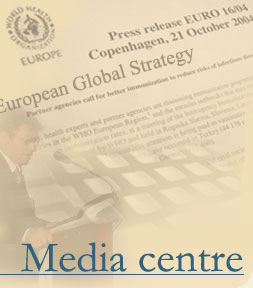More Deaths from Floods and Heat Waves?
Climate Change and Human Health
Copenhagen
Will we have more deaths from floods and heat waves as the Earth becomes warmer? Though the impact of climate change on human health has become a crucial issue of global health policies, it has yet to find its way onto the agenda of international negotiations. The cause lies, perhaps, with the difficulty of assessing the impacts of climate change on our health with certainty. The topic was discussed by leading international experts in environment and health at a closed-door meeting on 26-28 May 2000 at the Rome Division of the World Health Organization (WHO).
In spite of uncertainty, however, epidemiological surveys and computerised models enable scientists to collect evidence of possible health impacts of global warming. A warmer world would, for instance, create the ideal conditions for the spread of infectious disease vectors, such as mosquitoes and ticks. The percentage of human population at risk of malaria, dengue fever and other infectious conditions would, therefore, increase. Furthermore, some models estimate that in addition to the millions suffering from malnutrition, between 80 and 100 million people might risk starvation by 2080 due to a change in agricultural yields. As for floods and heat waves, these are just some of the direct effects of climate change that we are already witnessing.
Last year, at a ministerial conference on environment and health in London, European ministers approved several recommendations addressing the following goals: monitoring health impacts of global change; studying population vulnerability to climate change; and reviewing the prevention, mitigation and adaptation options available. The task of coordinating these actions has been entrusted to the Rome Division of WHO; the first formal step undertaken was the recent technical-scientific meeting held in Rome. At the meeting, a new document, entitled “Climate Change and Human Health: Impact and Adaptation”, was finalised and will be presented at the meeting of signatories of the UN Framework Convention on Climate Change, due to take place in Bonn, Germany, on 12-16 June.
Participants at the Rome meeting underscored the importance of international coordination of research in order to reduce the high degree of uncertainty connected with the understanding of human health impacts of climate change. The Director of the Rome Division of WHO, Roberto Bertollini, said that “it is crucial to monitor a few key indicators in order to gain a better understanding of what is going on; but it is no less important that the health of all citizens be put at the forefront in all environmental negotiations and policies.”
“We are experiencing a transition period of the greatest importance for the human species,” added Anthony J. McMichael of the London School of Hygiene and Tropical Medicine, one of the world’s leading experts on climate and health. “For the first time in global history, on a global level, man has begun to subvert the various systems supporting the life of the biosphere, as is evident in the changes of the climate system caused by the change in the atmosphere’s composition. The certainty that such changes will have a number of negative consequences on human health underscores the need to intensify research of these phenomena and to integrate the assessment of health hazards into the political debate and into decision-making processes.”
For more information, contact:
|
|
|

